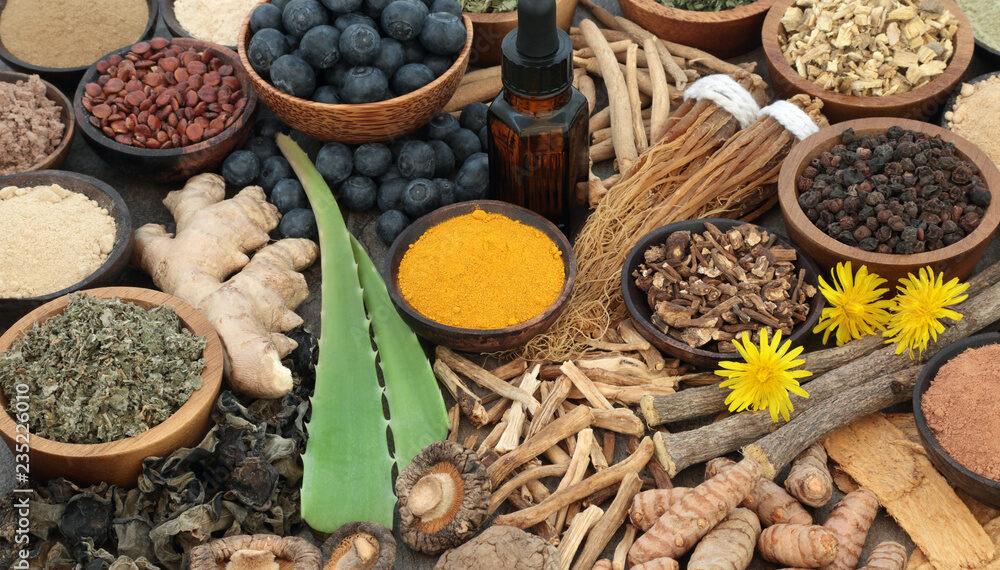Herbal Remedies: Specific Benefits and Uses of Popular Herbs
Herbal remedies have long been used for their natural healing properties, and their popularity has continued to grow in modern wellness practices. People are increasingly seeking alternatives to synthetic pharmaceuticals, preferring plants and herbs for their ability to treat a wide range of health issues. Here’s a deeper look into some popular herbs, their specific uses, and the health benefits they provide:
1. Chamomile: A Calming Herb for Sleep and Digestive Health
Chamomile is one of the most well-known herbs for promoting relaxation. It is commonly consumed in tea form, but chamomile extracts and essential oils are also available. Here’s how it helps:
- Sleep Aid: Chamomile contains apigenin, an antioxidant that binds to receptors in the brain, promoting sleepiness and relaxation. Drinking chamomile tea before bed can help you unwind and improve the quality of your sleep.
- Digestive Health: Chamomile is often used to relieve stomach discomfort, bloating, and indigestion. It has mild anti-inflammatory effects that can calm an upset stomach, making it a common remedy for digestive issues.
- Anxiety Relief: Chamomile has mild sedative effects that help alleviate mild anxiety and stress. It’s often recommended for individuals looking for a gentle, natural way to manage day-to-day stress.
2. Lavender: A Stress-Reliever and Sleep Enhancer
Lavender is widely praised for its calming properties, making it a go-to remedy for both mental and physical relaxation:
- Anxiety and Stress Relief: Studies have shown that lavender essential oil can reduce anxiety levels and improve mood. It’s commonly used in aromatherapy, where its scent promotes relaxation.
- Improved Sleep: Lavender is also known for its sleep-promoting qualities. A study in 2015 showed that participants who inhaled lavender essential oil before bed had improved sleep quality and duration.
- Pain Relief: Lavender oil has mild analgesic properties and is often used to alleviate minor headaches, muscle pain, and tension. You can apply lavender oil diluted with a carrier oil to the temples to relieve headache discomfort.
3. Echinacea: Boosting Immunity and Fighting Infections
Echinacea is primarily known for its ability to support the immune system and help fight off infections:
- Cold and Flu Relief: Echinacea is most commonly used to reduce the severity and duration of cold symptoms. It works by stimulating white blood cell production, which helps the body fight off infections more efficiently.
- Anti-inflammatory Effects: Echinacea also has anti-inflammatory properties, which can help reduce swelling in the body, especially during infections or respiratory issues like bronchitis.
- Skin Health: Echinacea is also applied topically to help heal wounds, burns, or insect bites, thanks to its antibacterial and anti-inflammatory properties.
4. Peppermint: For Digestive Health and Pain Relief
Peppermint has been used for centuries to aid digestion and treat a variety of gastrointestinal issues:
- Digestive Aid: Peppermint oil relaxes the muscles in the gastrointestinal tract, helping to alleviate symptoms like indigestion, bloating, and gas. It’s commonly used for conditions like irritable bowel syndrome (IBS) and acid reflux.
- Headache Relief: Applying diluted peppermint oil to the temples or the back of the neck can help reduce tension headaches. The menthol in peppermint provides a cooling sensation that helps ease pain.
- Respiratory Support: Peppermint’s menthol is also useful for clearing nasal passages. It is often used in steam inhalation to relieve sinus congestion and improve breathing.
5. Turmeric: An Anti-Inflammatory Powerhouse
Turmeric is most well-known for its active compound, curcumin, which has significant anti-inflammatory and antioxidant properties:
- Joint Pain and Arthritis: Curcumin in turmeric is known to block inflammatory pathways, making it an effective remedy for managing conditions like osteoarthritis and rheumatoid arthritis. Studies have shown that turmeric can reduce joint pain and stiffness in people with arthritis.
- Cognitive Health: There’s also evidence suggesting that curcumin can support brain health. It may help prevent neurodegenerative diseases like Alzheimer’s by reducing inflammation and oxidative stress in the brain.
- Digestive Health: Turmeric aids digestion by stimulating bile production, which helps break down fats. It can also soothe digestive discomfort and inflammation, such as bloating and irritable bowel syndrome (IBS).
6. Ginger: Soothing Nausea and Fighting Inflammation
Ginger is a versatile herb that has numerous health benefits:
- Nausea Relief: Ginger is well-known for its ability to relieve nausea and vomiting, particularly in cases of motion sickness, morning sickness during pregnancy, or nausea caused by chemotherapy treatments. It works by calming the stomach and promoting digestion.
- Anti-inflammatory Effects: Like turmeric, ginger has anti-inflammatory compounds that help with conditions like arthritis and muscle pain. Ginger can help reduce inflammation in the joints, which is why it’s commonly used in managing osteoarthritis and rheumatoid arthritis symptoms.
- Digestive Health: Ginger stimulates the digestive system, helping to alleviate bloating, indigestion, and constipation. It also helps to relax the muscles of the intestines, easing digestive discomfort.
7. Ashwagandha: Reducing Stress and Enhancing Energy
Ashwagandha is an adaptogen, a class of herbs that help the body adapt to stress and restore balance:
- Stress Reduction: Ashwagandha has been shown to lower cortisol levels, the stress hormone, helping to reduce overall stress and anxiety. It is often used in Ayurvedic medicine to manage mental health.
- Energy and Endurance: This herb is also known for boosting energy levels and improving endurance. It can support physical performance and reduce fatigue, which is why it’s popular among athletes and those with high-energy demands.
- Cognitive Function: Some studies suggest that ashwagandha can improve cognitive function and support memory, making it a potential ally in combating age-related cognitive decline.
8. St. John’s Wort: Natural Relief for Mood Disorders
St. John’s Wort is widely recognized for its ability to treat mild to moderate depression:
- Mood Enhancement: The herb contains hypericin, which is thought to work similarly to antidepressants by affecting serotonin levels in the brain. It has been shown to improve mood and reduce symptoms of depression.
- Anxiety Relief: In addition to depression, St. John’s Wort is sometimes used for anxiety and mild stress. It has a calming effect that helps alleviate nervousness and anxiety.
- Wound Healing: St. John’s Wort is also used topically for wound healing. It has anti-inflammatory and antibacterial properties that can help heal cuts, bruises, and burns.
Conclusion
Herbal remedies offer a diverse range of benefits for various health concerns. From stress relief and sleep support to digestive aid and anti-inflammatory effects, herbs like chamomile, lavender, peppermint, and turmeric provide natural solutions for improving overall wellness. However, it is essential to consult with a healthcare provider before using herbal treatments, especially if you are pregnant, nursing, or taking prescription medications.
#HearbalTIps
/jn/
This article was rewritten by JournosNews.com based on verified reporting from trusted sources. The content has been independently reviewed, fact-checked, and edited for accuracy, neutrality, tone, and global readability in accordance with Google News and AdSense standards.
All opinions, quotes, or statements from contributors, experts, or sourced organizations do not necessarily reflect the views of JournosNews.com. JournosNews.com maintains full editorial independence from any external funders, sponsors, or organizations.
Stay informed with JournosNews.com — your trusted source for verified global reporting and in-depth analysis. Follow us on Google News, BlueSky, and X for real-time updates.














